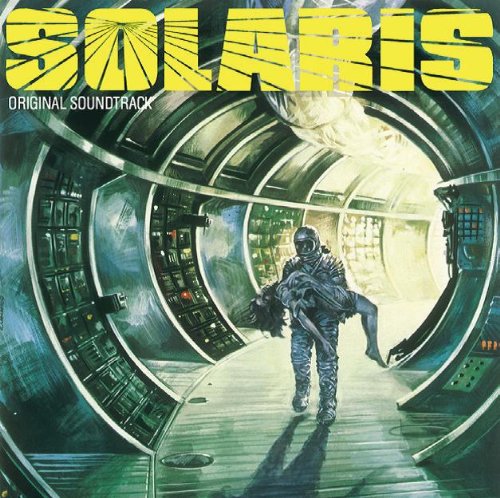
 |
|
 |
Format: LP Label & Cat.Number: Mirumir MIR100705 Release Year: 2013 Note: re-mastered version of the Soundtrack to this legendary metaphysically Science Fiction (& more) film , fully licensed by the composer, comes in gatefold sleeve with previously unpublished photos from the TARKOVSKY-archives, 180gr vinyl
Price (incl. 19% VAT): €20.00 Warning: Currently we do not have this album in stock!
More Info"Originally only available on a ultra-rare Japanese bootleg, Mirurmir is incredibly pleased to announce the first official issue of the groundbreaking and mind blowing soundtrack to Tarkovsky's masterpiece, Solaris.Composed by the electronic music pioneer, Edward Artemiev, Solaris was the first project in what proved to be a fruitful collaboration between director and composer. An absolutely essential piece of electronic music and Russian cinema history, lovingly reissued in a gorgeous gatefold package including previously unseen photos from the Tarkovsky archives and a cover pulled from the Italian poster for the film. Remastered from the original film soundtrack and pressed on high quality 180 gram vinyl." [label info] www.miru-mir.info "We are so excited to see this incredible score to one of our all time favorite films finally issued on vinyl. Long unavailable in any format, the electronic scores that Eduard Artemiev created for Russian director Andrei Tarkovsky's fantastic and meditative seventies sci-fi films Solaris, Mirror and Stalker are some of the most incredibly moving and brooding soundtracks we have ever heard. So much so, that the movies would not have had such a deep emotional impact without them. This original 1972 Solaris score (not to be confused with the later eighties re-recording, also being reissued on another label) in particular is eerily contemplative, full of chilling electro-acoustic drones, romantic Bach organ fugues and dreamily ponderous passages wrought with field recordings, gongs, and ghostly choruses, that are both beautiful and terrifying in equal measure. Solaris can be seen as the Eastern European counterpart to Stanley Kubrick's 2001: A Space Odyssey, as both films are meditative existential ruminations on the metaphysical schism that divides human and alien understanding. Based on Stanislaw Lem's 1961 novel, the film centers on a space psychologist Kris Kelvin who is sent to investigate the mysteriously stalled progress of a space expedition sent from Earth to study the strange planet Solaris. When he arrives, he finds the three person crew oddly isolated from each other and the station in disarray. The mystery deepens when he awakens the following morning and sees his late wife (who killed herself years ago) asleep beside him. It seems that the planet Solaris is actually a sentient life-form that is using the passengers' past memories as a means of communicating with them. However, not understanding what consequences may come about when confronted with uncanny manifestations of painful memories from the past, the planet's attempt at making contact with the expedition causes the crew to become emotionally dysfunctional and self-destructive. In Tarkovsky's multi-layered narrative, no amount of space travel can separate us far enough from the past that continually haunts us. In 17 movements, Artemiev's score is centered on Bach's "Choral Prelude for Organ in F Minor" as a recurring theme. The mix of classical and electro-acoustic music underlies the visual set design of the space station which also features oddly enough, reproductions of Old Master paintings, in particular the 16th century series "The Months" by Pieter Bruegel The Elder. The confluence of past and future motifs in the film as well as the score is startling effective allowing for an uneasy ruminative moodiness on the nature of time. The frigid electronic passages give voice to an oceanic planetary presence that is absolutely awe-inspiring beset in harrowing timbres that calm and intensify in subtle slow-moving waves. Only Tarkovsky can make windy wild meadows, foggy woods and tumultuous oceans feel so unfamiliar and freakishly alien. The second side opens up to more dreamier and stranger sonic passages, including a theme based on Kelvin's dead wife Hari that is beautifully haunting with a short choir interlude. From there, that leads into a snippet of Russian folk-song, and field recordings of birds, dogs, voices and gongs, with eventually both the Bach organ pieces and the cavernous electronics intermixing more and more intensely together with epic results..." [Aquarius Records] |
| © 2007 Drone Records | | Celler Strasse 33, 28205 Bremen, Germany | Privacy and cookies policy | Impressum / Allgemeine Geschaftsbedingungen / Haftungsausschluss | Links to the scene |